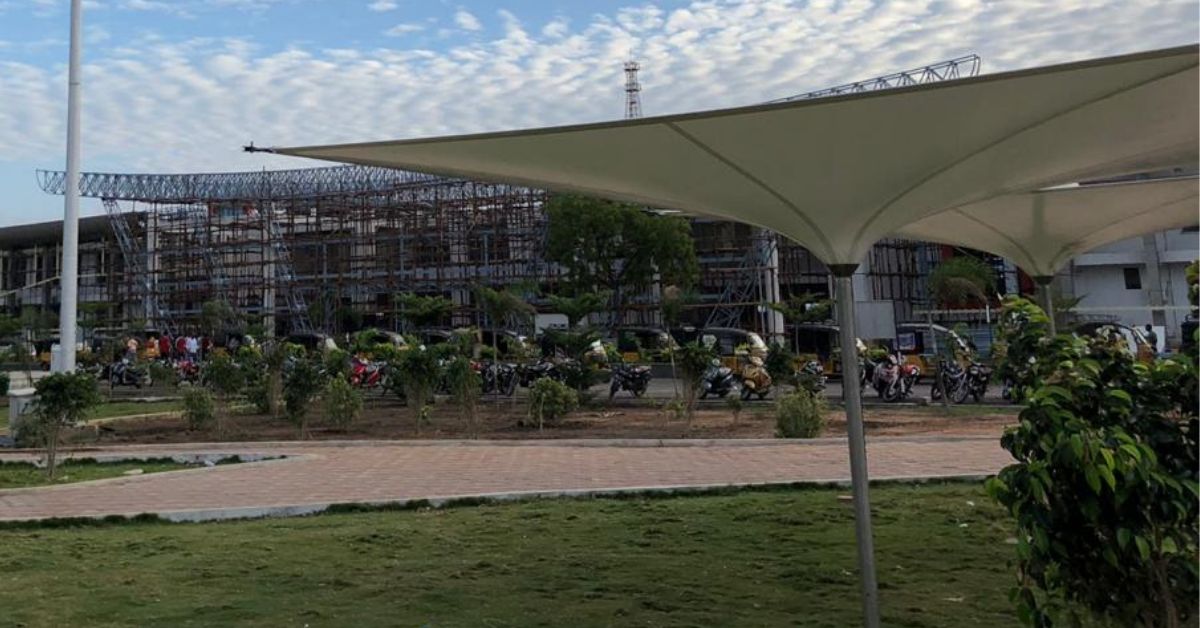Andhra Railway Station Harvests Sun & Rain, Is India’s First to Install ‘Ulta Chaata’
Having installed six of these innovative 'inverted umbrellas,' the Guntakal railway station now has the capacity to store 60,000 litres of water used to not just clean the station, but also to recharge the groundwater table!

With the installation of inverted umbrellas that harness solar energy and rainwater at the Guntakal railway station in Andhra Pradesh, the South Central Railway (SCR) has yet again shown its commitment towards providing a clean and green experience to its passengers.
These inverted umbrella canopies are also known as ‘Ulta Chaatas,’ and the railway station has six of these structures in its premises.
Save on electricity without compromising on cool. Check out these energy efficient and cost-effective fans that will help you cut down on those electricity bills by up to 65%
Speaking to The Better India, Rakesh, the Chief Public Relations Officer at SCR says,
SCR has always been at the forefront of taking green initiatives. This step (of inverted umbrellas) is another unique initiative taken by SCR, which not only strengthens our ongoing water conservation efforts but also further enhances the aesthetics of our stations.
He adds that the primary intention of these canopies is to utilise the sustainable space and harness solar, renewable energy apart from other utilizations like mobile charging, laptop charging and seating arrangements.

The SCR has spent around 14 lakhs on this project. Each structure weighs about 120 kilos, and the umbrellas have been installed in the circulating area.
40-watt efficient LED lamps have been installed on each of the square-shaped canopies, which also comprise a lithium-ion battery, automated sensor controls and a monocrystalline flexible panel.
The lightweight panel can charge solar-compatible batteries which can be used in emergencies and to power devices and appliances. All units come with in-built inverters.
As for the water conservation part, each canopy can store 60,000 litres of water. The canopies will recharge the groundwater and also transport some of it to a tank.

“The water stored in tank will be used for non-potable purposes like washing, cleaning and gardening,” says Rakesh.
The inverted umbrella is an invention of a green technology startup ‘ThinkPhi’ founded by Samit Choksi and his wife, Priya Vakil Choksi.
As per the SCR, the Guntakal is the first railway station in India to have installed this unique combination of collecting water during monsoons and producing electricity from solar panels in the dry seasons.
Other Green Measures Taken By South Central Railway
Under the ‘Swachh Rail, Swachh Bharat’, Indian Railways is taking numerous steps, from banning plastic, installing plastic bottle crushers, converting wet waste into manure to introducing vertical gardens.
The SCR is actively trying to introduce sustainable measures in all its six divisions including Secunderabad, Hyderabad, Vijayawada, Guntakal, Guntur and Nanded.
Secunderabad Railway Station has been Awarded Platinum Rating
by Indian Green Building Council – Confederation of Indian Industry (IGBC – CII) pic.twitter.com/jcQgsmqk3a— Ministry of Railways (@RailMinIndia) May 23, 2018
For instance, in 2017, Secunderabad railway station was tagged as India’s first ‘Green Railway Station’ by the Indian Green Building Council – Confederation of Industry (IGBC-CII). The station uses organic fertilisers to grow 408 species of plants and trees in its premises.
It also has a solar plant that produces 2,500 units of power daily, meeting 37 per cent of the station’s energy needs. Other green initiatives include plastic bottle crushing machines, bio-toilets, rainwater harvesting pits and a Sewage Treatment Plant (STP). Read more about the station here.
Kacheguda Railway station under the Hyderabad division has a de-compost and disposable water bottle crushing machine. While the compost machine processes 125 kilos of wet waste per day, the crushing machine recycles 2-3 kilos of waste plastic bottles daily.
Similar bottle crushers are also installed at Secunderabad and Nizamabad (Vijayawada division) stations.
With lakhs of passengers commuting every day across more than 8,000 railway stations, the waste generated, power consumption and water used, to maintain the platforms and tracks clean, is massive.
Accordingly, there is a dire need for all railway stations to establish an infrastructure that uses less natural resources and lightens the pressure on the environment.
In this regard, the other railways can certainly take lessons from the South Central Railway.
Also Read: New Move by Railways: Soon Watch Movies, Soap Operas for Free on Mumbai Locals!
(Edited by Gayatri Mishra)
Like this story? Or have something to share?
Write to us: [email protected]
Connect with us on Facebook and Twitter.
If you found our stories insightful, informative, or even just enjoyable, we invite you to consider making a voluntary payment to support the work we do at The Better India. Your contribution helps us continue producing quality content that educates, inspires, and drives positive change.
Choose one of the payment options below for your contribution-
By paying for the stories you value, you directly contribute to sustaining our efforts focused on making a difference in the world. Together, let’s ensure that impactful stories continue to be told and shared, enriching lives and communities alike.
Thank you for your support. Here are some frequently asked questions you might find helpful to know why you are contributing?


This story made me
-
97
-
121
-
89
-
167











